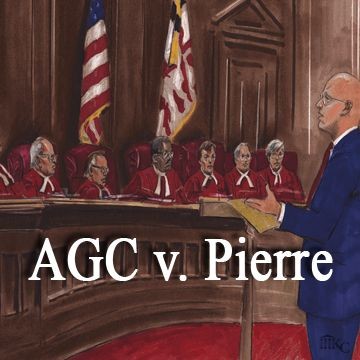The Lawyer's Lawyer
Ethics Questions for Ethics Official
Raising questions "about the appearance of impropriety" on the part of its top ethics official, the Supreme Court of Maryland asked whether Bar Counsel used her official position "to undermine ... a candidate in a Judicial election."
In Attorney Grievance Comm'n v. Marylin Pierre, Bar Counsel pressed charges against a grassroots challenger for a seat on the Circuit Court for Montgomery County. Within an hour of receiving campaign literature from incumbent judges seeking to defeat their rival, Bar Counsel opened an official state investigation and worked with the Sitting Judges campaign to compile evidence against Ms. Pierre.
Worried "that Judiciary resources are being used to intervene in this sitting judges election campaign," Justice Shirley Watts expressed concern over an "appearance of impropriety" in favoring one campaign over another:
JUSTICE WATTS: So in addition to a question about a broad conflict in the use of Judiciary resources and potentially intervening or being perceived as intervening in the sitting judge's election, I have a question about professional conflict of interest where you as Bar Counsel are concerned.
You receive the email as a member of the Montgomery County Bar Association in that capacity. It was not a complaint to your office. How would a reasonable member of the public know whether in initiating this investigation you were acting in your capacity as Bar Counsel or as a member of the Montgomery County Bar Association with an interest in helping the campaign as requested?
MS. LAWLESS: Your Honor, it's because I was acting in my official capacity as Bar Counsel. All correspondence sent and received were in my official capacity as Bar Counsel.
JUSTICE WATTS: So the answer is basically we would take your word for it?
This was the very same case that the Court had to stay when Ms. Lawless refused to respond to discovery propounded by Ms. Pierre's defense counsel.
Charged with multiple violations of the Maryland Attorneys' Rules of Professional Conduct, many of the allegations against her involve comments attributed to Ms. Pierre which were critical of Montgomery County's circuit court bench. Fighting these charges, defense counsel argued that statements made in the course of a heated campaign are subject to the highest level of First Amendment protection and should not be censored by a state official intervening in an ongoing election.
Four days after this Supreme Court hearing, Ms. Lawless announced her resignation. See Lee O. Sanderlin, Before Resigning, Top Md. Grievance Lawyer Faced Questioning on Ethics, The Baltimore Sun (February 11, 2023).
Argued: February 2, 2023.
Decided: August 16, 2023
Read the Opinions of Chief Justice Fader, Justice Battaglia and Justice Watts
